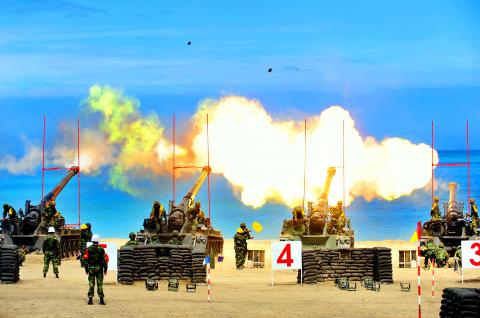The latest computerized scenario carried out by the military showed that in a war with China, Taiwan’s military was able to defeat enemy forces after they landed and tried to occupy the country, a local newspaper said yesterday.
The Chinese-language China Times reported that the Han Kuang 27 computerized war games held from July 18 to July 23 showed the military would survive a first strike from the People’s Liberation Army’s (PLA) from the air and sea. In the simulation, after PLA troops landed in the central part of the country, Taiwanese troops surrounded the enemy forces in the Dadu Mountain (大肚山) area near Greater Taichung and annihilated them.
This was the best performance in computerized war games carried out by the military in recent years, the newspaper said.

Photo: Chang Chung-yi, Taipei Times
Under the scenario, which assumed war next year, the PLA launched about 1,000 ballistic missiles and cruise missiles to attack Taiwan’s air force, civilian airports and various military facilities, before sending in ground troops from the sea and air, the newspaper said.
The scenario also had China’s Il-76 airlifters, which carry a number of paratroopers, taking off from airports in Fujian Province with air support from Su-30 aircraft.
Those paratroopers then carried out a successful occupation of Taiwan’s military airports.
Out at sea, a division of PLA landing craft groups would head toward Taiwan, with more than 100,000 soldiers crossing the Taiwan Strait in civilian vessels.
The report said the landing craft groups would pretend to be heading toward northern Taiwan and that the Sixth Army Corps stationed in northern Taiwan would prepare to ward off the enemy. However, the sea troops would suddenly change direction and land in the area near Taichung Harbor and the Dajia River (大甲溪).
PLA troops would occupy Taichung Harbor and Cingcyuangang Air Force Base in Greater Taichung, putting the Taiwanese military at a disadvantage.
However, after the army defeated the small forces landing on northern and southern Taiwan, the Eighth Army Corps succeeded in heading to the Dadu Mountain area and with the mobilization of reserve troops, the military surrounded enemy forces and defeated them.
The report said the key point to winning the war simulation is that after the PLA launched the missile strikes, Taiwan’s air force quickly moved its major fighters into tunnels at Hualien Air Force Base. With air support from fighters and helicopter forces, the army was able to defeat the enemy in the Greater Taichung area in the simulation.
Military spokesman David Lo (羅紹和) said the military would not comment on the news report.

The High Prosecutors’ Office yesterday withdrew an appeal against the acquittal of a former bank manager 22 years after his death, marking Taiwan’s first instance of prosecutors rendering posthumous justice to a wrongfully convicted defendant. Chu Ching-en (諸慶恩) — formerly a manager at the Taipei branch of BNP Paribas — was in 1999 accused by Weng Mao-chung (翁茂鍾), then-president of Chia Her Industrial Co, of forging a request for a fixed deposit of US$10 million by I-Hwa Industrial Co, a subsidiary of Chia Her, which was used as collateral. Chu was ruled not guilty in the first trial, but was found guilty

DEADLOCK: As the commission is unable to forum a quorum to review license renewal applications, the channel operators are not at fault and can air past their license date The National Communications Commission (NCC) yesterday said that the Public Television Service (PTS) and 36 other television and radio broadcasters could continue airing, despite the commission’s inability to meet a quorum to review their license renewal applications. The licenses of PTS and the other channels are set to expire between this month and June. The National Communications Commission Organization Act (國家通訊傳播委員會組織法) stipulates that the commission must meet the mandated quorum of four to hold a valid meeting. The seven-member commission currently has only three commissioners. “We have informed the channel operators of the progress we have made in reviewing their license renewal applications, and

‘DENIAL DEFENSE’: The US would increase its military presence with uncrewed ships, and submarines, while boosting defense in the Indo-Pacific, a Pete Hegseth memo said The US is reorienting its military strategy to focus primarily on deterring a potential Chinese invasion of Taiwan, a memo signed by US Secretary of Defense Pete Hegseth showed. The memo also called on Taiwan to increase its defense spending. The document, known as the “Interim National Defense Strategic Guidance,” was distributed this month and detailed the national defense plans of US President Donald Trump’s administration, an article in the Washington Post said on Saturday. It outlines how the US can prepare for a potential war with China and defend itself from threats in the “near abroad,” including Greenland and the Panama

Taiwan People’s Party (TPP) Chairman Huang Kuo-chang (黃國昌) yesterday appealed to the authorities to release former Taipei mayor Ko Wen-je (柯文哲) from pretrial detention amid conflicting reports about his health. The TPP at a news conference on Thursday said that Ko should be released to a hospital for treatment, adding that he has blood in his urine and had spells of pain and nausea followed by vomiting over the past three months. Hsieh Yen-yau (謝炎堯), a retired professor of internal medicine and Ko’s former teacher, said that Ko’s symptoms aligned with gallstones, kidney inflammation and potentially dangerous heart conditions. Ko, charged with